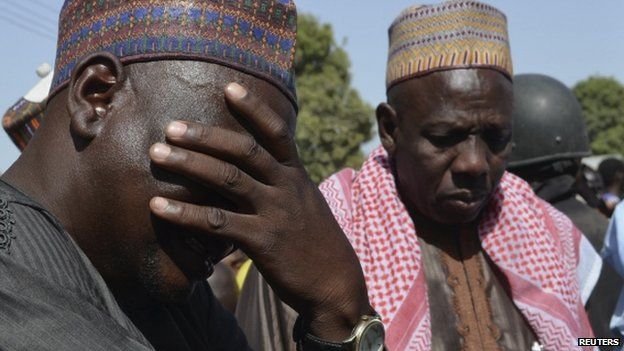Nigeria girls' abduction: Chibok parents plead for help
- Published

Parents of the 230 schoolgirls abducted in north-eastern Nigeria have marched to plead for more help to find their daughters, residents in the town of Chibok have told the BBC.
The girls were taken from their school in Chibok by suspected Islamist militants more than two weeks ago.
One parent, who asked not to be named, said they were grateful for the support of Nigerians, as other marches are held to put pressure on the authorities.
"We want to see more effort," she said.
The Islamist group Boko Haram has not made any response to the accusation that its fighters abducted the girls in the middle of the night on 14 April 2014.
The group, whose name means "Western education is forbidden" in the local Hausa language, has staged a wave of attacks in northern Nigeria in recent years, with an estimated 1,500 killed in the violence and subsequent security crackdown this year alone.
'Discreet' mission
On Wednesday, several hundred people, mainly women, dressed in red braved heavy rain to march to the National Assembly in the capital, Abuja, to hand over a letter to complain that the government was not doing enough to secure the release of the girls.
"We thank the women for their support," the parent in Chibok told the BBC Hausa service, saying such marches might push the government to make more of an effort to locate the girls.
"We are pleading for others who are outside... to please come and help us, because the burden is too much for us parents," she said.
As she spoke, crying and wailing could be heard from others marching through Chibok.
She said that she was desperate to know what had happened to her daughter and that a dead body was better than no body at all.
Earlier, Nigeria's Interior Minister Abba Moro told the BBC that he understood the "outpouring of emotions", but the government could not divulge details of what it was doing to secure the release of the girls.
It had to act in a "discreet" way because the militants had threatened to kill the girls if "certain steps" were taken, he said.
Will Ross reports from a protest in Abuja where mothers have been pressing for the release of 230 schoolgirls abducted by militants two weeks ago
He accused opposition parties of politicising the crisis and said they should work with the government rather than criticise it.
Following the march in Abuja, more than 20 senators requested a meeting with President Goodluck Jonathan. They met on Wednesday night but no details of their discussions are known.
Swathes of north-eastern Nigeria are, in effect, off limits to the military, allowing the militants to move the girls towards, or perhaps even across, the country's borders with impunity, says the BBC's Will Ross in Abuja.
The students were about to sit their final year exam and so are mostly aged between 16 and 18.
Boko Haram leader Abubakar Shekau first threatened to treat captured women and girls as slaves in a video released in May 2013.
It fuelled concern at the time that the group was adhering to the ancient Islamic belief that women captured during war are slaves with whom their "masters" can have sex, correspondents say.